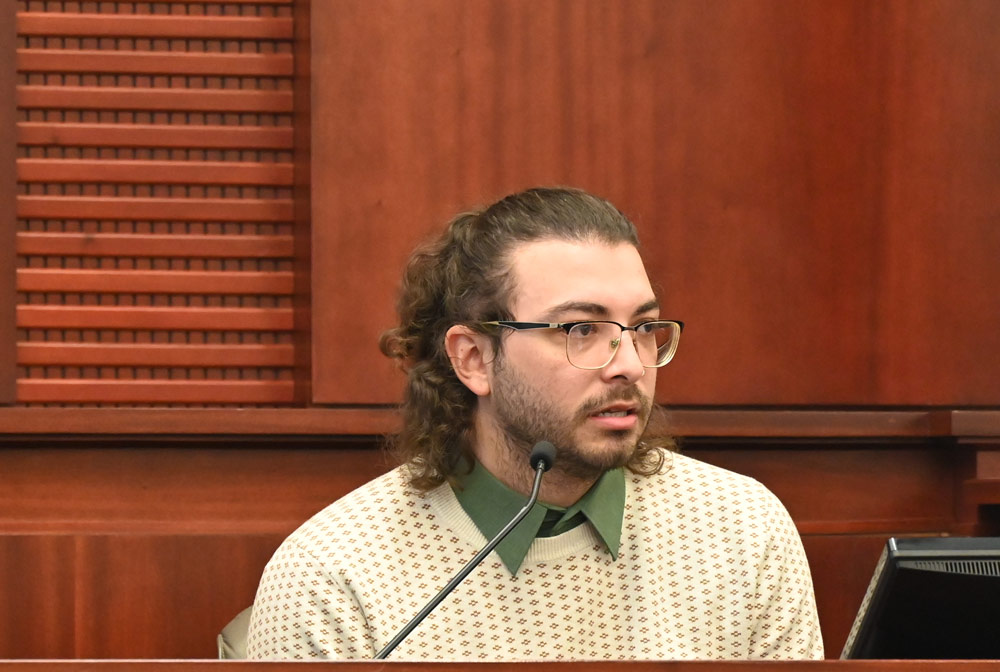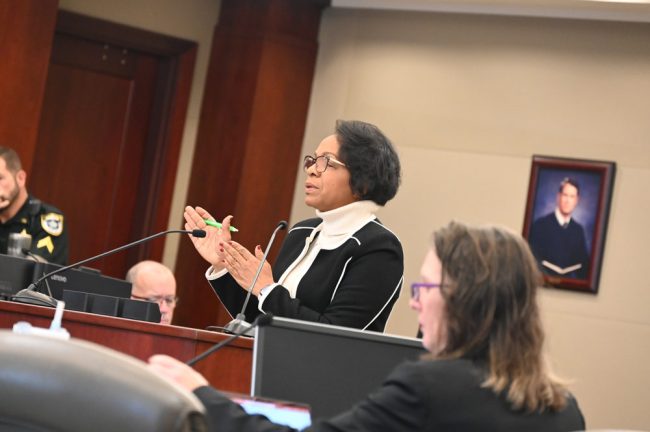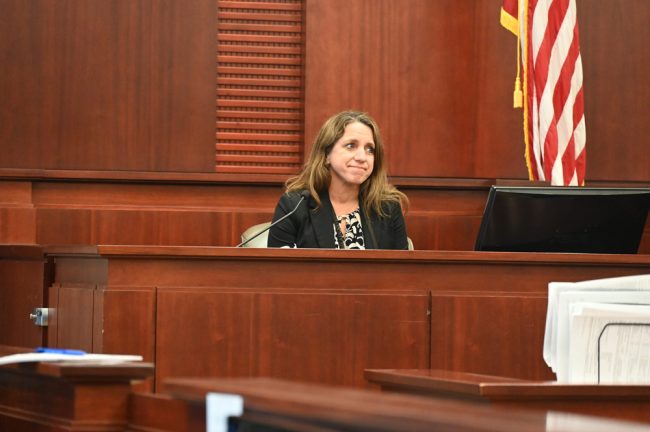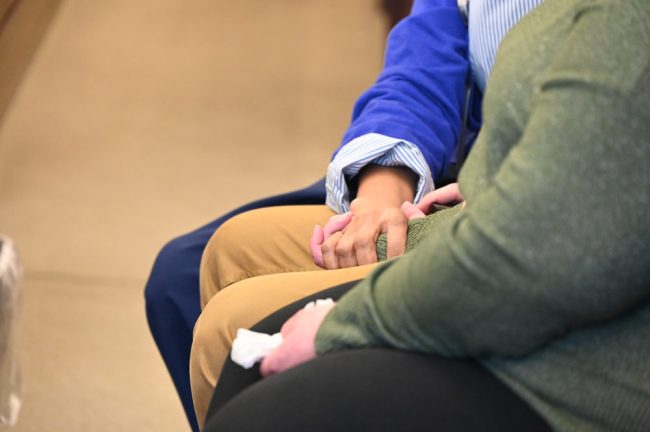
A jury of three men and three women in mid-morning today found Daniel Rodriguez, 27, guilty on all charges of sexually assaulting and molesting a young boy he had groomed and befriended since he was 10, and started abusing when he was 11, until he was 13. The abuse took place in Palm Coast between 2020 and 2022.
Rodriguez faces mandatory life in prison without parole when he is sentenced at a later date. The judge will have no discretion to lessen the sentence.
Before trial the state had offered Rodriguez a plea deal: 40 years in prison and a lifetime designation as a sexual predator. Circuit Judge Daw Nichols cautioned Rodriguez in December that based on his recorded admissions and the victim’s own statements, including a 90-minute video-recorded interview with an expert therapist in child maltreatment, Rodriguez was taking a huge risk by going to trial.
Rodriguez turned down the deal. He was willing to serve no more than 10 years in prison. Even today, when he took the stand in his own defense, he spoke of the assaults as if everyone was making of them more than what they were. While acknowledging “making mistakes,” he described himself almost in saintly terms, as a good guy doing good for a struggling family and a fatherless boy.
Subtly, but perceptively, he shifted blame on the boy for seeking him out sexually–a frequent, almost unfailing tactic among adult abusers of children. “I wouldn’t call it romantic, I would call it exploratory,” Rodriguez said of his physical assaults on the boy, which started with kissing, and which he never described as assaults. “He had a habit of watching suggestive videos on the internet, and all of a sudden, there was tongue involved.”
He did not speak angrily, vindictively or even defensively, and seemed still enamored of the boy, who did not attend his testimony. The boy reentered the courtroom just before closing arguments. He sat with his mother, with a victim’s advocate and with Annie Conrad-Lagana, the Flagler County Sheriff’s detective who investigated the case. A bailiff had to order Rodriguez to look forward, not back at the family. The judge had ordered him to do likewise on Tuesday.
By the time Rodriguez testified, several members of the jury were visibly put off by him: two men–an older juror and a younger one–barely looked at him for the 30 minutes he was on the stand, a third looked at him only periodically. The older juror looked as if he did not want to be there as Rodriguez spoke of how “I care about them a lot,” referring to the boy’s family.
They had tuned him out.
The jury deliberated for only a matter of minutes before reaching its decision on all five charges: it was out of the courtroom barely 15 minutes before bailiffs said it had reached a verdict. But the defense had really not put on a defense. It had made no opening arguments. It raised not a single objection all three days of trial. It did not even cross-examine the detective, which is unheard of in such trials.
What defense Rodriguez presented to the jury when he testified today, and when his attorney made her closing arguments, is that the repeated acts of oral sex he performed on Elliot started after the boy turned 12.
Elliot disagreed. When he testified and when he was interviewed by the expert in child maltreatment, he was adamant that the abuse started before the pandemic of 2020–when he was 11. He turned 12 in October 2020, half a year into the pandemic.
For Rodriguez, the difference between 11 and 12 was the difference between life in prison or perhaps less: he was charged with raping and molesting a child younger than 12, a capital and a life felony, one of them punishable by mandatory life in prison, the other punishable by up to life, as well as three second-degree felony counts of molesting a child older than 12, each punishable by a maximum of 15 years in prison.
“The question becomes not when did he do it, but when did that sexual molestation begin,” Nicole Jordan-Dixon, Rodriguez’s attorney, told the jury in her closing argument. Children get details wrong, she said, repeating the words she had elicited from the maltreatment expert when she briefly cross-exained her. “I ask if you find that if there is a question in your mind regarding Elliot’s age, you find Daniel guilty of the lesser included offense of those charges.”
“Lesser-included” means reduced charges that are included on the jury’s verdict form. These would have found Rodriguez guilty of illegally touching Elliot, but not of molesting or raping him. As Assistant State Attorney Melissa Clark told the jury, those lesser-included charges would have applied for the most case if the contacts had been between two adults–not between an adult and a child.

Rodriguez had become close to the boy’s single mother and her three children–the boy had two sisters–visiting them frequently in their Palm Coast homes, becoming a father figure and “best friend” to the boy (as both Rodriguez and the boy described the relationship), lavishing gifts and food on the boy, and paying the rent in one case. He said he did so because he’d “found somebody who pushed me to be better every single day.”
When the touching began and evolved to oral sex, which Rodriguez performed (never the other way around), Rodriguez claimed it was never for his gratification.
“There was curiosity, obviously, after the touching began, and that’s just how things ended up,” he said. “But it wasn’t for my gain. In the beginning, I wouldn’t say that I was doing it for his gain, either. It was just something that I felt was an act.”
“So you would like this jury to believe that you weren’t sexually aroused by performing oral sex on this little boy,” Clark asked him.
“I was not,” he said, describing it as a “massive difference” between the acts with the boy and acts with “people who I am actually sexually interested in.”
“I would agree with you. Yes, this is not something you would expect a little boy to have to go through, right?” Clark told him.
“Yeah.”
“But you made the choice to do that.”
“Yeah.”
The testimony had set up Clark for some of the most pointed demolitions of the defendant as she closed to the jury. “Come on,” she said in disbelief. “We’re talking about an 11 year old boy, a 12 year old boy and a 13 year old boy. This was the defendant who had perverse sexual desires, acting them out on a little boy. This in no way, shape or form was ever Elliot’s fault. This is entirely the defendant’s fault. He made the conscious decision over and over and over again to sexually exploit that little boy and that’s why we’re here.”
In her final moment speaking to the jury, Clark projected on the overhead screens two of the three pictures the jury had already seen–selfies apparently taken by Rodriguez, of himself in an intimate cuddle with Elliot, kissing him on the lips when Elliot was between 10 and 12. “There should be no doubt in your mind this was a little boy,” Clark told the jury.
There wasn’t.
After the verdict and after the jury was dismissed, Nichols, the judge, told the defense that while the defendant is entitled to a pre-sentencing investigation, normally conducted to gauge the appropriate sentence, a PSI in this case would be superfluous, since the mandatory sentence must be imposed. She was hoping the defense would concede the point and agree to an immediate sentence, thus sparing Elliot and his mother the trouble of a subsequent hearing, which they could only attend by zoom from Pennsylvania. But the defense insisted on a PSI.

The judge asked Elliot–who she referred to by name, because she did not want to call him a “victim”–if he wanted to make a statement. He and his mother opted to wait until sentencing.
By then Rodriguez had been ushered out, but not before he again looked back intently toward Elliot, as if to make visual contact with him. After the judge left, Elliot and his mother hugged for two minutes, spoke to each other in a murmur, and hugged again before filing out of the courtroom with Clark, the victim’s advocate and the detective.
A sentencing date has yet to be set. Rodriguez returned to the Flagler County jail, all bonds revoked. He’s been at the jail for a year and a half–time that normally would have been credited to his sentence. But since he declined a deal, the credit is irrelevant now that he will be sentenced to life without the possibility of parole.
(*) The name is a pseudonym.
![]()






























TR says
Well while in prison he can get the treatment he gave to the little boy. Bubba will be his new friend.
Matt says
Bring on the justice!
JimboXYZ says
I couldn’t imagine sitting thru this trial as a juror with the evidence & testimonies of the prosecution. But I guess fair & impartial it’s the dog & pony show to get the jury decision. The plea deal was 40 years, counter for 30 years, Defendant wanted only 10 years. He might have stood a chance if he hadn’t admitted anything in the deposition interviews & maintained innocence from the start. But since he admitted to the acts, along with the under 12 year old mandatory life sentence, he was doing that as a slam dunk guilty verdict. Let’s hope this is the last of anything similar going forward. Although this community seems to have more than it’s share, adjusted per capita for it’s relative population density ?
https://flaglerlive.com/daniel-rodriguez-rejects-plea/
Endless dark money says
If he had money he could have paid off the victim like republicans do regularly. Chief con has over 27 girls that accused him of sexual assault and not one day in jail. Rules for thee and not for me say the GoP.
having sexual assault charges is now a requirement for republicans.
Let’s go felon!
Eric says
It continues to amaze me that there is not a law that makes it so these complete wastes of human flesh are not ALWAYS put away in prison forever. Just think folks, these sick scumbags actually prey on innocent children. The damage they do is unfathomable. Most get ‘slaps on the wrist’ because of plea deals. These sick pedophiles DO NOT deserve to live freely. If you look at the amount of sexual offenders that live amongst us, it’s frightening. Every week it’s a new story about some sick demented piece of shit sexually abusing a child. When are we as a society actually going to do something about it instead of just accepting it. I think this site should annually do a posting reminding the community of ALL these demented individuals that breathe our air.